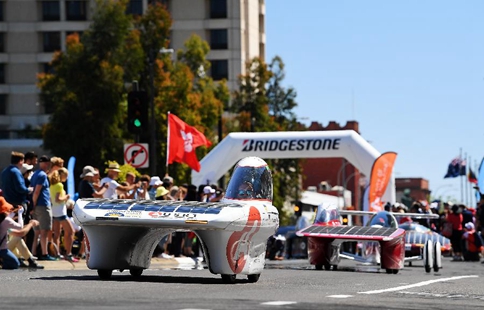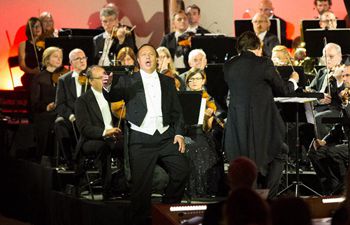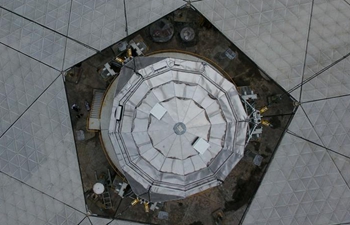WASHINGTON, Oct. 16 (Xinhua) -- The executive director of the gravitational wave detector LIGO on Monday hailed the first detection of such a signal as well as light from the same cosmic event as opening the door to an "entirely new kind of astronomy" and said that China could play an "exciting" role in studying these ripples in space and time.
David Reitze and his colleagues announced at a news conference at the National Press Club in Washington D.C. on Monday that a collision of two neutron stars about 130 million light years away has been observed through both gravitational waves and telescopes, which has never been done before.
"I think this is a really major discovery in the history of astronomy," Reitze, also a professor of physics at Caltech, told Xinhua in an interview after the new briefing.
"It's the first time that we've been able to use both gravitational waves which is a very new tool -- this is only something that's existed for a couple of years -- and all of the kinds of astronomy that we've done for tens and hundreds and even, you know, 400 years." he said.
"By having all of those different ways of looking at the event, it gives you a much more complete picture of the gravitational wave event, of the light that comes off the event," he said. "So it's really for us a new kind of astronomy and we're learning all kinds of things."
For example, heavy elements such as gold and platinum are produced in the collisions of neutron stars and when these objects collide they also produce "short-hard" gamma ray bursts, all of which are questions that people have been asking for decades and now are able to answer, he said.
Yet, in the words of Reitze, the discovery made on August 17 by LIGO's twin detectors in Louisiana and Washington states still was something of a surprise.
"WoW, I mean, it's really WoW," he said.
This event, he explained, was amazing in many ways, including the facts that it's 10 times closer to us than any of the four previous gravitational wave signals created by black holes and that the plane of orbits was oriented in a way that the gamma ray signal could be seen.
"Just statistically speaking, you're not always going to see the gamma rays and that means that you're not always going to have light to be able to look at, so this was an amazing event," Reitze continued. "So my reaction was WoW. I can't believe it."
To highlight the significance of the new discovery, Reitze took out from his pocket a gold watch that he said his grandmother inherited from her father and gave him when he was still a little boy.
"This was a watch that was probably bought in the early 1800s and it's coated in gold," he said. "The chance that the gold in this watch were produced by the collision of two neutron stars many billions of years ago, probably more than five billions of years ago, is very high."
"So the gold everybody wears and their wedding rings and their earrings, their bracelets, all the gold stored in gold bars, were probably produced by the collision of a binary neutron star," he said. "Amazing!"
Reitze said that he knows that there have been some discussions in China about building gravitational wave detectors and that a number of challenges that other countries have to overcome, including land, people and money, maybe, are not problems in China.
"So I think there's a real role if China wants to become involved in gravitational waves," he said. "China, I know, has thought about putting their own space-based gravitational wave detector up and that would be very, very exciting."
When asked to predict the future of gravitational astronomy, Reitze said although Einstein's theory of general relativity has been proven right again and again, but it can't be the ultimate theory because it's hard to reconcile it with quantum mechanics.
"People have been working for a long time to try and bring those two theories together, the problem is that there's no experimental evidence to sort of guide you where you want to go," he said.
"So it may be and I'm not going to promise this, but for me it would be very exciting, if we see that in the collisions of black holes, for example, that the nature of spacetime tells us through the gravitational wave emissions something about the quantum nature of gravity, that would be amazing."
LIGO's groundbreaking gravitation wave discovery in 2015 was so important that three American scientists behind it were awarded the Nobel Prize in physics this month, but could we expect more?
"That's up to the Nobel Prize Committee," Reitze said, laughing. "I was very glad that they gave the Nobel Prize to Rainer Weiss, Kip Thorne and Barry Barish. I think they were very deserving of it."

















